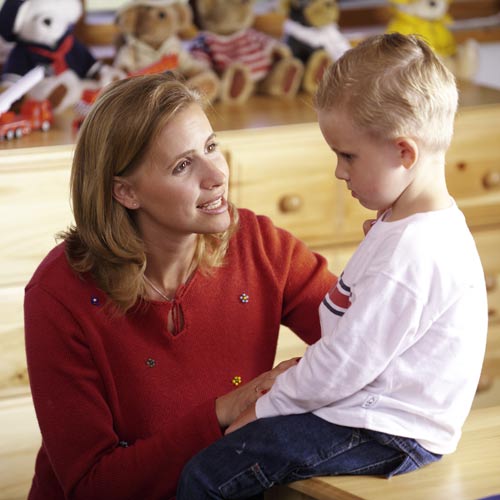When a young child falls down and hurts him or herself, many parents naturally reach out and console the child with a hug and soothing words to show that they understand that the child is sad and is in pain. Occasionally, a parent feels the pull to deny the child’s suffering and say something like, “That didn’t hurt. You are a big brave boy. Show me a smile.” However, to do so is to deny the child’s reality. From the child’s perspective, it did hurt, and at that moment, he or she is not feeling brave or big and certainly does not feel like smiling. Hurts happen, and when they do, a parent’s job is to help the child to be able to cope. While we cannot protect our children from all the frustrations and pains that life will present them, we can help them to cope with them. One very important coping skill is being able to identify and label what one is feeling. As some say, “To name it is to tame it.”
Here’s another example: Your child does poorly on a test and comes home from school screaming that she is “so stupid.” Wanting to help her feel stronger, you might be inclined to say that she is not stupid and remind her how smart she is. While this may soothe her at the moment, you may be missing the target. Possibly your daughter did poorly because she never studied for the test. Maybe she needed some help in a particular area and was afraid to ask her teacher for assistance. Whatever the case, if you jump in with “You’re so smart,” you will miss out on hearing more about what is really going on for your child. It would have been more productive for you to have translated the “stupid” comment. It’s fine to acknowledge your child’s disappointment, but then you need to explore what went wrong so that she feels understood by you and empowered to go about things differently next time.
When your child says something extreme—such as “I wish I were dead” or “I want to kill myself” —you need to translate this comment, too. More often than not, it means something like, “I am so mad (or sad, scared, ashamed, etc.) right now. I don’t want to feel this feeling one more moment, and I want it to go away.” A parent is often understandably horrified at hearing such words and may be inclined to react strongly. Assuming that it is absolutely clear that your child is not immediately in danger*, an appropriate response might be to say something to the child along the lines of, “I know that you are mad (or whatever the parent hypothesizes the feeling is), but I need help in understanding it better.” If, in fact, you are wrong in labeling it “mad,” then in all likelihood, your child will probably tell you what he is feeling. That, in itself, is an important step in helping to diffuse what feels unmanageable to him and to pave the way for better discussions, enhanced identification and labeling of feelings, and more active listening on your part.
Bottom line, your message to your child is that you love him, even when he has those big, strong, scary feelings.
*If there is any doubt whatsoever about your child’s safety, it is important to call for professional help immediately.

